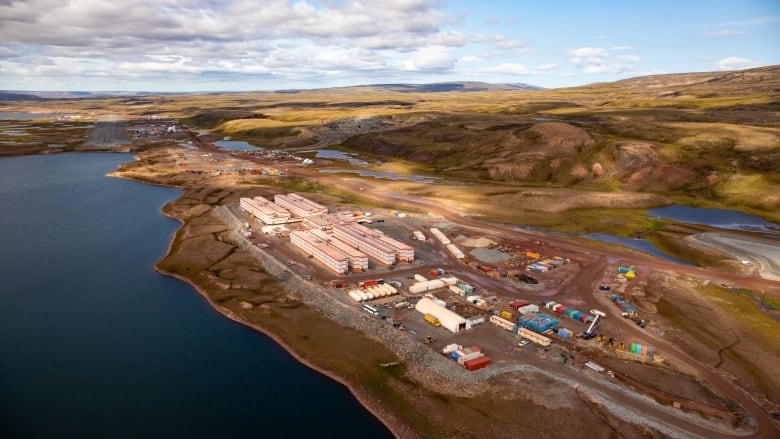Mary River agreement between QIA and Baffinland leaves mayors, hunters uneasy
Leaders from 5 north Baffin communities say their Inuit association isn't representing them

Hamlet mayors and hunters associations in the five communities closest to Nunavut's Mary River Mine are unhappy with an agreement signed in June between Baffinland Iron Mines Corporation and the Qikiqtani Inuit Association (QIA).
In a letter to the Nunavut Impact Review Board last week, leaders from Pond Inlet, Igloolik, Sanirajak, Arctic Bay, and Clyde River said no "meaningful" discussion was had with their communities before the two parties signed a 176-page Inuit Certainty Agreement that Baffinland CEO Brian Penney said is worth $1 billion over the life of the mine.
Now the mine's long-planned expansion — that would see production at least double at Mary River, along with more shipping and a railway built at the site outside of Pond Inlet — is "about to pit five Inuit communities, affected by the proposal, against their own regional Inuit association," said the North Baffin Community Group, made up of those community leaders.
The communities say they want that expansion to slow down, until they understand how increased shipping will impact the "largest populations of narwhal in the world" and what barriers that a rail, the first in the Canadian Arctic, could have on caribou migration.
"We expect [the Qikiqtani Inuit Association] to represent and be reflective of Inuit concerns and those of our communities," the letter states. "Both the content and the process of putting together this [Inuit Certainty Agreement] suggests that it may be difficult for the QIA to adequately represent our concerns and issues."
The QIA says that while the new benefit agreement is intended to clear up most technical concerns communities had with the expansion at Mary River, it doesn't directly reflect the opinions of the five impacted north Baffin communities.
We don't have a clear picture yet.- Merlyn Recinos, Igloolik mayor
When it was released in June, QIA President P.J. Akeeagok called the agreement "unprecedented," and said it was negotiated with communities in mind to give voice to Inuit in development and control over the environment. The agreement allows for wildlife monitors at the mine and a committee to oversee environmental concerns as they come up.
He also acknowledged then that concerns over the health of caribou and marine mammal populations still need to be addressed through public hearings with the Nunavut Impact Review Board.
Communities call Inuit association 'bias'
But the newly founded North Baffin Community Group said the Inuit Certainty Agreement shows that the QIA is biased toward the "speedy" resumption of the mine's environmental review.
It calls the QIA a "landowner" with priorities that are different from the hunters and municipalities.
Most benefits in the Inuit Certainty Agreement, including an increase in royalties, will only come to Inuit if the mine expansion is approved by the board.
"Both Baffinland and the QIA, supposedly representing Inuit interests, stand to benefit financially from the proposed development," the North Baffin Community Group said in its release.
It said the mining company's concern over losing the confidence of its investors is "driving a process with intergenerational implications for the social and cultural well-being of Inuit hunters and their families."

The community group's letter to the board says that in February, it asked the mine and the Inuit organization to wait before working on any agreement about financial benefits.
The Inuit organization shared the agreement with hamlets and hunters groups in lengthy meetings over zoom throughout June and July.
There are plain language explainers about the agreement available to the public in Inuktut, but the full agreement isn't translated yet.
Expansion in stalemate because of pandemic
Environmental hearings and technical meetings for phase two of the expansion remain on hold, after being ended unfinished last November.
Igloolik Mayor Merlyn Recinos says communities weren't ready in March when the mine hearings were supposed to start up again. Since then, the time and resources the community had to prepare for new hearings were used for COVID-19, he said.
"The mine is something that was at the back of our mind. It wasn't our priority. Our priority was to make sure our community was safe. We had to come up with emergency plans," he said.
Environmental impacts the mine calls "low risk" could be life changing for communities, said Recinos.
"We believe they are significant. What we are trying to understand is how significant they are to our local communities, because we don't have a clear picture yet," he said.
In an email, the QIA said it shares concerns that the communities have with rescheduling meetings again during a pandemic. In a letter, it asked the Nunavut Impact Review Board to consider the impacted communities' request not to start any meetings until late November.
Baffinland already has infrastructure for the expansion waiting at the mine, and last year laid off more than 500 workers because the expansion didn't go ahead as it had hoped.
Pond Inlet Mayor Joshua Arreak, says there's no hurry because the iron ore isn't going anywhere. He said jobs at the mine for Inuit aren't happening because of COVID-19.
"We need to do this properly, that's what we are saying. If there is any information that we need to know, it has to be communicated to us," Arreak said.